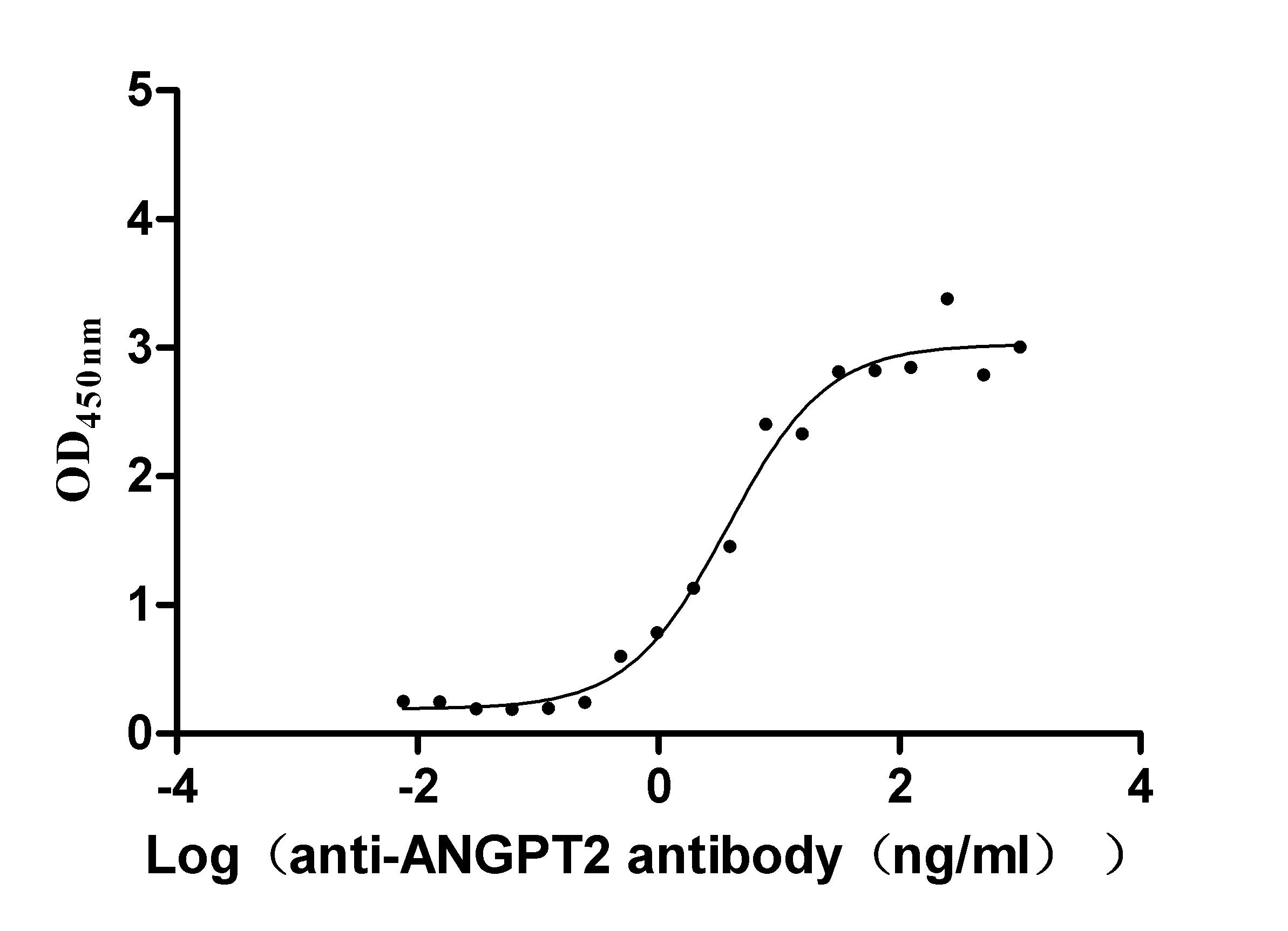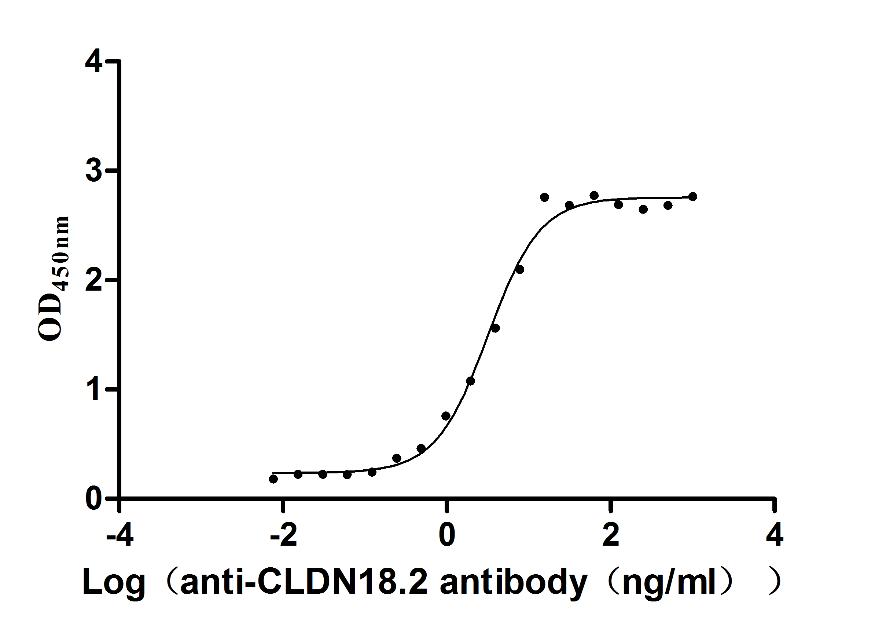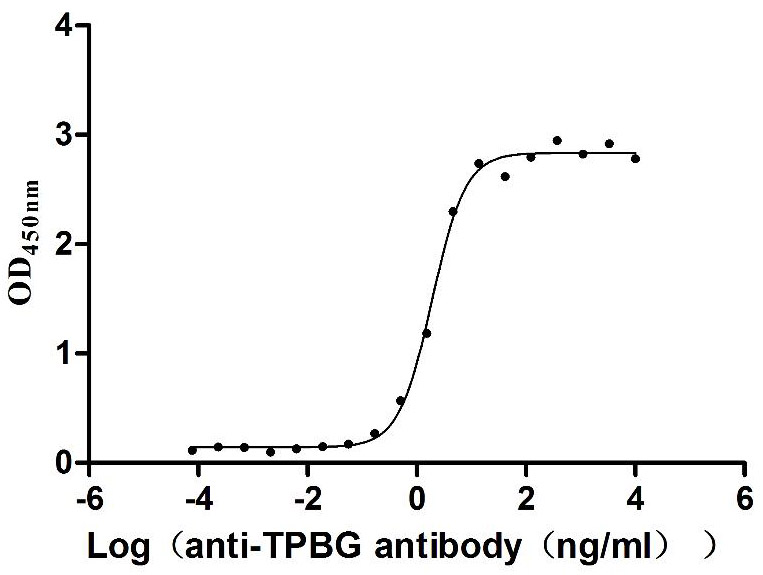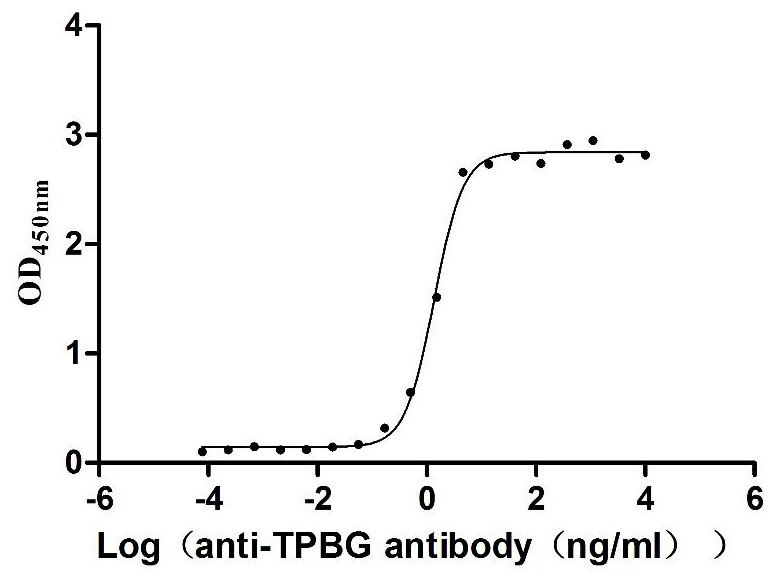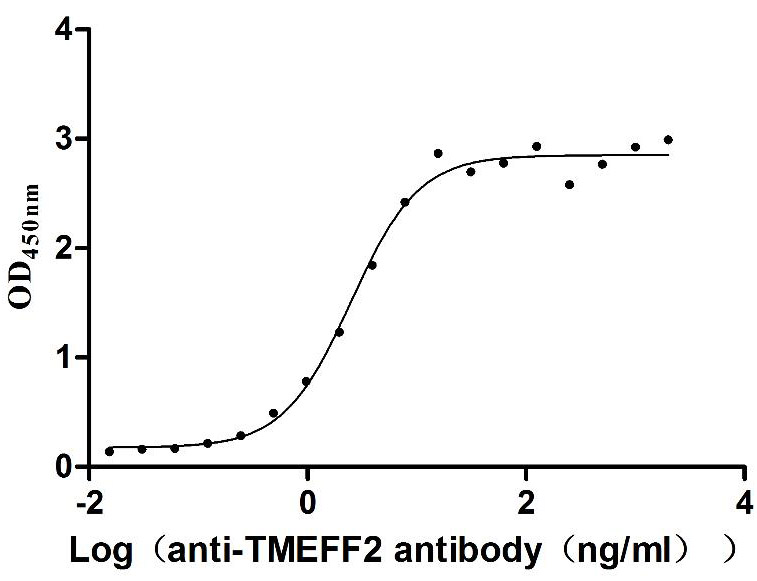Recombinant Mouse Midkine (Mdk)
-
中文名稱:小鼠Mdk重組蛋白
-
貨號:CSB-YP013624MO
-
規格:
-
來源:Yeast
-
其他:
-
中文名稱:小鼠Mdk重組蛋白
-
貨號:CSB-EP013624MO-B
-
規格:
-
來源:E.coli
-
共軛:Avi-tag Biotinylated
E. coli biotin ligase (BirA) is highly specific in covalently attaching biotin to the 15 amino acid AviTag peptide. This recombinant protein was biotinylated in vivo by AviTag-BirA technology, which method is BriA catalyzes amide linkage between the biotin and the specific lysine of the AviTag.
-
其他:
-
中文名稱:小鼠Mdk重組蛋白
-
貨號:CSB-BP013624MO
-
規格:
-
來源:Baculovirus
-
其他:
-
中文名稱:小鼠Mdk重組蛋白
-
貨號:CSB-MP013624MO
-
規格:
-
來源:Mammalian cell
-
其他:
產品詳情
-
純度:>85% (SDS-PAGE)
-
基因名:
-
Uniprot No.:
-
別名:Mdk; MkMidkine; MK; Retanoic acid-responsive protein; Retinoic acid-induced differentiation factor
-
種屬:Mus musculus (Mouse)
-
蛋白長度:Full Length of Mature Protein
-
表達區域:23-140
-
氨基酸序列KKKEKVKK GSECSEWTWG PCTPSSKDCG MGFREGTCGA QTQRVHCKVP CNWKKEFGAD CKYKFESWGA CDGSTGTKAR QGTLKKARYN AQCQETIRVT KPCTSKTKSK TKAKKGKGKD
-
蛋白標簽:Tag?type?will?be?determined?during?the?manufacturing?process.
The tag type will be determined during production process. If you have specified tag type, please tell us and we will develop the specified tag preferentially. -
產品提供形式:Lyophilized powder
Note: We will preferentially ship the format that we have in stock, however, if you have any special requirement for the format, please remark your requirement when placing the order, we will prepare according to your demand. -
復溶:We recommend that this vial be briefly centrifuged prior to opening to bring the contents to the bottom. Please reconstitute protein in deionized sterile water to a concentration of 0.1-1.0 mg/mL.We recommend to add 5-50% of glycerol (final concentration) and aliquot for long-term storage at -20℃/-80℃. Our default final concentration of glycerol is 50%. Customers could use it as reference.
-
儲存條件:Store at -20°C/-80°C upon receipt, aliquoting is necessary for mutiple use. Avoid repeated freeze-thaw cycles.
-
保質期:The shelf life is related to many factors, storage state, buffer ingredients, storage temperature and the stability of the protein itself.
Generally, the shelf life of liquid form is 6 months at -20°C/-80°C. The shelf life of lyophilized form is 12 months at -20°C/-80°C. -
貨期:Delivery time may differ from different purchasing way or location, please kindly consult your local distributors for specific delivery time.Note: All of our proteins are default shipped with normal blue ice packs, if you request to ship with dry ice, please communicate with us in advance and extra fees will be charged.
-
注意事項:Repeated freezing and thawing is not recommended. Store working aliquots at 4°C for up to one week.
-
Datasheet :Please contact us to get it.
相關產品
靶點詳情
-
功能:Secreted protein that functions as cytokine and growth factor and mediates its signal through cell-surface proteoglycan and non-proteoglycan receptors. Binds cell-surface proteoglycan receptors via their chondroitin sulfate (CS) groups. Thereby regulates many processes like inflammatory response, cell proliferation, cell adhesion, cell growth, cell survival, tissue regeneration, cell differentiation and cell migration. Participates in inflammatory processes by exerting two different activities. Firstly, mediates neutrophils and macrophages recruitment to the sites of inflammation both by direct action by cooperating namely with ITGB2 via LRP1 and by inducing chemokine expression. This inflammation can be accompanied by epithelial cell survival and smooth muscle cell migration after renal and vessel damage, respectively. Secondly, suppresses the development of tolerogenic dendric cells thereby inhibiting the differentiation of regulatory T cells and also promote T cell expansion through NFAT signaling and Th1 cell differentiation. Promotes tissue regeneration after injury or trauma. After heart damage negatively regulates the recruitment of inflammatory cells and mediates cell survival through activation of anti-apoptotic signaling pathways via MAPKs and AKT pathways through the activation of angiogenesis. Also facilitates liver regeneration as well as bone repair by recruiting macrophage at trauma site and by promoting cartilage development by facilitating chondrocyte differentiation. Plays a role in brain by promoting neural precursor cells survival and growth through interaction with heparan sulfate proteoglycans. Binds PTPRZ1 and promotes neuronal migration and embryonic neurons survival. Binds SDC3 or GPC2 and mediates neurite outgrowth and cell adhesion. Binds chondroitin sulfate E and heparin leading to inhibition of neuronal cell adhesion induced by binding with GPC2. Binds CSPG5 and promotes elongation of oligodendroglial precursor-like cells. Also binds ITGA6:ITGB1 complex; this interaction mediates MDK-induced neurite outgrowth. Binds LRP1; promotes neuronal survival. Binds ITGA4:ITGB1 complex; this interaction mediates MDK-induced osteoblast cells migration through PXN phosphorylation. Binds anaplastic lymphoma kinase (ALK) which induces ALK activation and subsequent phosphorylation of the insulin receptor substrate (IRS1), followed by the activation of mitogen-activated protein kinase (MAPK) and PI3-kinase, and the induction of cell proliferation. Promotes epithelial to mesenchymal transition through interaction with NOTCH2. During arteriogenesis, plays a role in vascular endothelial cell proliferation by inducing VEGFA expression and release which in turn induces nitric oxide synthase expression. Moreover activates vasodilation through nitric oxide synthase activation. Negatively regulates bone formation in response to mechanical load by inhibiting Wnt/beta-catenin signaling in osteoblasts. In addition plays a role in hippocampal development, working memory, auditory response, early fetal adrenal gland development and the female reproductive system.
-
基因功能參考文獻:
- leukocyte domiciled midkine mediates increased plasma levels of VEGFA relevant for upregulation of endothelial nitric oxide synthase 1 and 3 PMID: 29233575
- Study demonstrates that regulation of astroglial responses to lipopolysaccharide administration are highly dependent on the levels of expression of pleiotrophin and midkine. PMID: 29061398
- MDK functions in the ventral tegmental area to limit ethanol consumption and levels of CCL2 PMID: 28398003
- It may be involved in the regeneration of acinar cells in acute pancreatitis. PMID: 27992669
- Analyses of the melanoma secretome and validation in clinical specimens showed that the heparin-binding factor midkine is a systemic inducer of neo-lymphangiogenesis that defines patient prognosis. This role of midkine was linked to a paracrine activation of the mTOR pathway in lymphatic endothelial cells. PMID: 28658220
- MK limits amphetamine-induced striatal neuroinflammation PMID: 28044069
- MK serves an indispensable role in the NFAT-regulated activation of CD4(+) T cells and Th1 cell differentiation. PMID: 28183532
- Ethanol engages MDK (and ALK) signaling, which has important consequences for alcohol-induced neurotoxicity. PMID: 26206265
- Mdk plays a crucial role in the early inflammation phase and during the development of cartilaginous callus in the fracture healing process. PMID: 25551381
- MK-deficient mice produced higher amounts of epoxyeicosatrienoic acids (EETs), and EETs dominantly regulated blood pressure in these mice. PMID: 25377079
- This study demonistrated that a differential regulation of specific behavioural responses to ethanol by midkine. PMID: 25149366
- clonidine-induced analgesia was significantly enhanced in PTN-/- mice compared to MK-/- and WT+/+ mice in the tail-immersion test PMID: 23891830
- MK did not lead to an inflammatory activation of neutrophils suggesting that it does not serve as classical proinflammatory cytokine. PMID: 24458438
- midkine plays a critical role in cardiac hypertrophy and remodelling. PMID: 24291499
- Midkine exerts a neuroprotective role against amphetamine-induced neurotoxicity in striatum. PMID: 23459167
- MK leads to a blockade of PAI-1, which is closely associated with the suppression of crescentic glomerulonephritis. PMID: 23201132
- Soluble rhMDK, rmMDK and rhPTN were expressed at a high-level and the protein was purified by a one-step purification using heparin affinity chromatography. Activity of purified rhMDK and rhPTN was confirmed by a cell proliferation assay. PMID: 22871361
- Findings indicate a critical role for the midkine-Notch2 signaling axis in neuroblastoma tumorigenesis, which implicates new strategies to treat neuroblastoma. PMID: 23243020
- This study concluded that MEK is essential for acquisition of gliogenic competence by radial progenitors and that levels of MEK activity regulate gliogenesis in the developing cortex. PMID: 22998872
- Identify endothelial cells as the source of soluble midkine in the vascular system during hypoxia and defined midkine as a pivotal player of angiogenesis during ischemia in nonmalignant tissue. PMID: 22707563
- identify significant differences between PTN and MK in the control of pain processing at the spinal level, and support the hypothesis that inhibitors of the PTN/MK signaling pathway could potentiate opioid analgesia PMID: 22342918
- Midkine knock-out mice display pronounced impairments in their olfactory discrimination ability and short-term social recognition memory with no gross motor alterations. PMID: 21301897
- midkine aggravates experimental autoimmune encephalomyelitis by suppressing tolerogenic dendritic cell development, thereby impairing the regulatory CD4(+)CD25(+)Foxp3(+) T cell population PMID: 22323540
- data demonstrate that Mdk-deficiency in mice has an anabolic effect on mechanically induced cortical bone formation PMID: 21185956
- It is a growth factor which plays a role in pathogenesis of neoplasms and inflammations and is a neuroprotectant in case of nerve injuries. (review) PMID: 21089377
- Mdk deficiency, at least in mice, results in an increased trabecular bone formation. PMID: 20200993
- Midkine promotes self-renewal and proliferation of mouse embryonic stem cells. PMID: 20442752
- Neuroprotective effect of midkine gene transfer persisted until the subacute phase of brain infarction. Midkine may contribute to neuronal regeneration. These results suggest the usefulness of midkine gene transfer for treatment of brain infarction. PMID: 19535098
- A lack of MK following sciatic nerve injury is a critical factor in degeneration and regeneration. PMID: 19437545
- Antisense oligodeoxynucleotide targeted to Midkine, a heparin-binding growth factor, suppresses tumorigenicity of mouse rectal carcinoma cells. PMID: 11731432
- midkine binds to ALK and has a role in signal transduction for cell growth and survival PMID: 12122009
- midkine expression is associated with postnatal lung development, but not necessarily with hyperoxic cell damage. PMID: 12207052
- Midkine expression in nephrogenesis and its role in ischaemic reperfusion injury. MK induces chemotaxis of inflammatory leukocytes into the tubulointerstitium and contributes to aggravation of ischaemia-induced tubulointerstitial damage. PMID: 12386288
- MK staining in the respiratory epithelial cells correlated with sites of expression of thyroid transcription factor (TTF) -1, a transcription factor regulating formation and gene expression in the lung parenchyma. PMID: 12761850
- Pleiotrophin and Midkine are differently expressed and distributed during retinoic acid-induced neural differentiation PMID: 14708942
- nuclear targeting growth factor midkine undergoes proteasomal degradation PMID: 14970216
- MK participates in each of the two distinct phases of rheumatoid arthritis development, namely, migration of inflammatory leukocytes and osteoclast differentiation, and is a key molecule in the pathogenesis PMID: 15146411
- Midkine is regulated by hypoxia and causes pulmonary vascular remodeling PMID: 15197188
- midkine has a role in susceptibility to cisplatin-induced renal damage PMID: 15509530
- Midkine antisense phosphorothioate oligodeoxyribonucleotide reduced ischemia reperfusion injury to kidney epithelium. PMID: 15780085
- MK may play a role in epithelium-mesenchyme interactions, blood vessel signaling, and the decision of proliferation vs differentiation. PMID: 15823575
- These data support potentially high levels importance of MK and the MK/PTN developmental gene family in downstream signals initiated by angiotensin II. PMID: 15979460
- midkine regulates pleiotrophin gene expression with a high degree of organ specificity, suggesting that pleiotrophin gene expression follows midkine gene expression in development PMID: 15985215
- MK together with pleiotrophin are very important regulators of the catecholamine pathway in mouse aorta and may critically regulate catecholamine biosynthesis. PMID: 16643958
- Left ventricular fractional shortening 24 hours after ischemia/reperfusion injury in midkine (Mdk)-deficient mice is significantly less than that in Mdk-expressing wild-type mice. PMID: 17015789
- Female infertility in mice may result from deficiency in Mdk. PMID: 17121547
- Midkine-STAT3 signaling pathway plays a necessary role in mitotic clonal expansion and differentiation. PMID: 17204554
- High glucose upregulated Midkine expression in primary-cultured tubular epithelial cells of streptozotocin-induced diabetic mice with diabetic nephropathy. PMID: 17607302
- Glucocorticoid receptor-null lungs included p21 CIP1 (decreased 2.9-fold, P < 0.05), a negative regulator of the cell cycle, and Mdk (increased 6.0-fold, P < 0.05), a lung growth factor. PMID: 17901120
- Deficiency in midkine (MK), a heparin-binding growth factor involved in oncogenesis, inflammation, and tissue repair, attenuated experimental autoimmune encephalomyelitis (EAE) because of an expansion of the Treg cell population in peripheral lymph nodes. PMID: 18319343
顯示更多
收起更多
-
亞細胞定位:Secreted.
-
蛋白家族:Pleiotrophin family
-
組織特異性:Expressed in the follicular epithelium and granulosa cells of the ovary.
-
數據庫鏈接:
Most popular with customers
-
Recombinant Dog Angiopoietin-2 (ANGPT2) (Active)
Express system: Mammalian cell
Species: Canis lupus familiaris (Dog) (Canis familiaris)
-
Recombinant Macaca fascicularis Claudin 18.2 (CLDN18.2)-VLPs (Active)
Express system: Mammalian cell
Species: Macaca fascicularis (Crab-eating macaque) (Cynomolgus monkey)
-
Recombinant Macaca fascicularis Trophoblast glycoprotein (TPBG), partial (Active)
Express system: Mammalian cell
Species: Macaca fascicularis (Crab-eating macaque) (Cynomolgus monkey)
-
Recombinant Human Trophoblast glycoprotein (TPBG), partial (Active)
Express system: Mammalian cell
Species: Homo sapiens (Human)
-
Recombinant Human Tomoregulin-2 (TMEFF2), partial (Active)
Express system: Mammalian cell
Species: Homo sapiens (Human)


